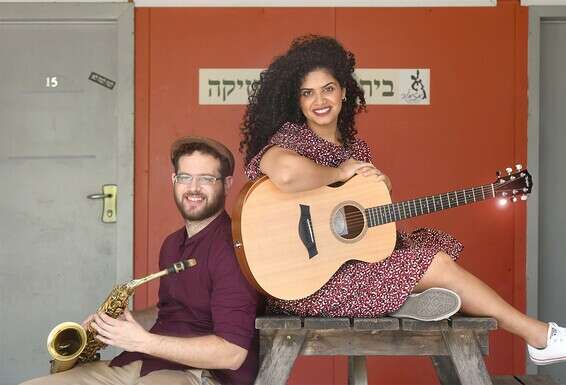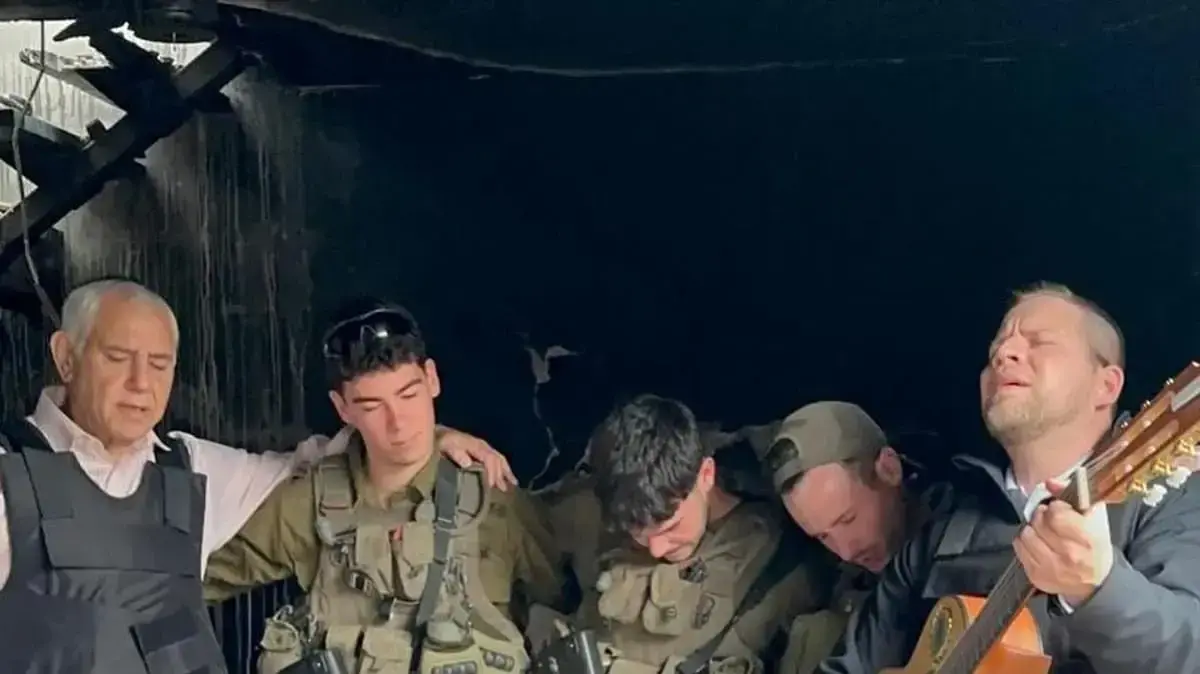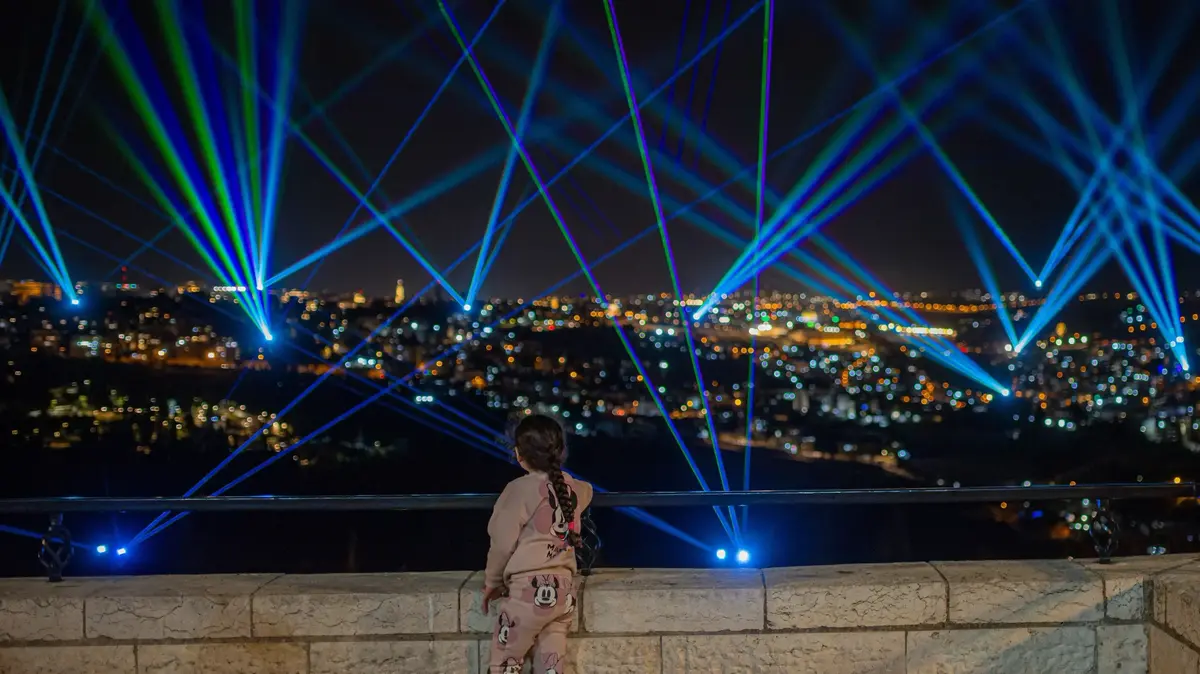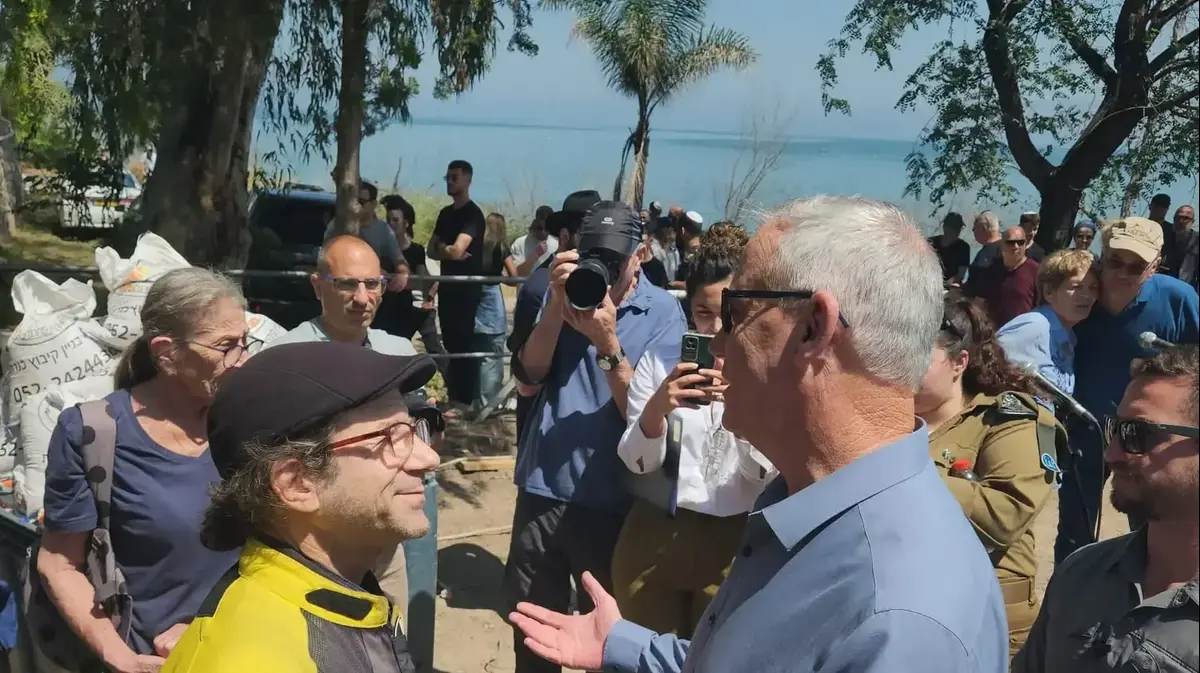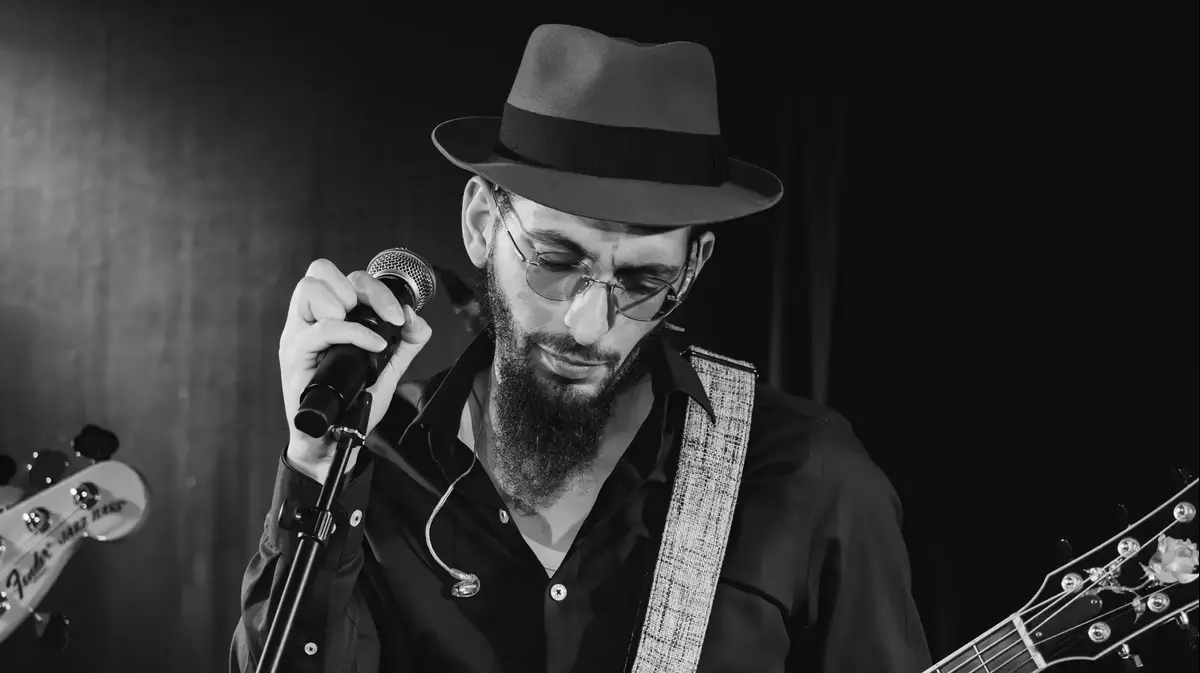The "Mizmor" music school is considered the religious version of "Rimon", but when the teaching staff also has rockers from the heart of the Tel Aviv scene, bridges are created that are difficult to find today in the divided society. • Hemi Rodner: Extreme echoes "
Naor Carmi, Itzik Weiss, Dvir Bar-Sela, Hadar Zakaria, Din Din Aviv, Hemi Rodner and Ariel Horowitz
Photography:
Efrat Eshel
In the cultural chaos of recent months, when the performances are canceled and the melody does not sound enough as we really would like, the music school "Psalm" seems like a lonely island of sanity and hope.
And not just in the artistic aspect.
The spacious area surrounded by a fence decorated with huge musical notes, between Gedera and Ashdod, also blurs the rifts between right and left, between religious and secular and between different and other opposing camps that so characterize Israeli society.
Even the Corona, which has disrupted the lives of all of us, has failed to ruin the magical atmosphere of this place, which was established ten years ago and has since let music speak.
"Psalm" was established to give religious composers and musicians a place to learn their favorite field without compromising their values, out of a need that comes from the field, explains Itzik Weiss - the school's general manager (alongside Matan Chepenitzky as academic director) and the initiator.
The bridge created by the school between parts of Israeli society has already been built by the teaching staff, including well-known artists such as Rona Keinan, Hemi Rodner, Ariel Horowitz, Mika Karni, Dean Din Aviv, Dana Berger, Daniel Zamir, Avi Leibowitz, Ilan Damari and more.
"11 years ago one of the musicians in my band asked me why there is no 'Rimon' school for the religious, and I thought it was a good idea," says Weiss (44), a musician himself, drummer, producer and arranger who lives in Karnei Shomron, "I offered it to my father, who was The head of the College of Education in Washington Hill, and he proposed the idea to the board of the place, just before he retired. The idea was accepted and for a year we worked with Daniel Zamir on the establishment. We tried to think what the justification for this place was, why we needed it. Such among the religious public.
"At that time this public was very mediocre in the field of art, which was considered a hobby for the afternoon or maximum for the potential to play at weddings. There was no professional horizon, and certainly no thoughts on being a creator in the field and we wanted people with musical talent to go home at a young age. The book, from there to 'Psalm' and later on to look at art as a profession.With the establishment of the school there was a real revolution in the sector and two or three years later suddenly the amount of music trends in religious high schools increased.
"There is a sense of sharing and experience here to pargan." Hadar Zakaria (right) and Dvir Bar-Sela // Photo: Efrat Eshel
"We opened 'Mizmor' for a three-year program, in which about 70 students out of 100 examinees are accepted each year, in two main majors: performance major (music) and master major. Creator (poetry, a man who sings his songs) .Now we also start a musical production trend.I would not define 'Psalm' as religious but as a Jew, and Judaism in the end, in my eyes, it is between a person and his friend, it is not to run over each other, it is mutual help The school engraved it on its banner and also holds it in practice. There is no atmosphere of competition here, there is a lot of mutual help, personal treatment and investment of the teachers. I know every student, it is not a moving film, it is hard work but in my eyes it is the way "In art, you have to look at the person."
In practical terms, what restrictions still exist in the name of religion and halakhah?
"On Shabbat there are no studies and no activities. As for kosher - I do not look at anyone's plate, and as for the contents - we have never issued a ban on not touching and dealing with one subject or another, but due to the fact that one respects the other you will not hear dirty language. "We do not force anyone to come with a skirt, for example, but people here respect each other, it is really special. There is a special atmosphere and depth in the work."
The art is to take out, not close
"Most of the teachers are not religious," Weiss explains to me. "On the contrary, when we founded the school, most of the quality musicians we were looking for were not religious, some who repented like Naor Carmi or Din Din, but one of the main things we wanted to happen here is that "Precisely for a culture that is beyond the fence without being afraid of it and will feel close to it. The discourse that is forged between the teachers and the students enriches and brings the teachers closer as well."
"Tolerance is the root." Rodner // Photo: Efrat Eshel
We met with four of the teachers - all singers and composers from various fields in Israeli music: Din Din Aviv, Hemi Rodner, Ariel Horowitz and Naor Carmi.
Despite the differences in attitudes, affinity for religion and musical style, everyone seems to be a little in love with this place, talking about it with shining eyes and mostly full of appreciation and loyalty to the manager and what he represents.
Carmi: "I am one of the first teachers. Daniel Zamir, a friend of mine, brought me here. I lead the ensembles and teach Jewish music. In the Torah there are great depths written about music and to be a musician today you have to come with a spiritual back."
Aviv: "One day I received a phone call from Naor, who told me that a religious-religious figure was needed at school, someone to talk to the girls, and that attracted me the most. I feel that the work here is healing, I only teach girls, three years ago I started doing the separation and I appear Only for women. "
What do you really do with the issue of women's exclusion and women's poetry, which is a very explosive issue in Israeli society? How does a religiously defined school break this thing down in peace?
Weiss: "The religious public is the widest and most diverse public there is. It has sub-genders and we have students from all groups: elite, liberals, religious, ultra-Orthodox, national-religious and also secular from the area and ultra-Orthodox. In most classes there is no separation between boys and girls , Except for singing lessons, composing songs and improvisation in singing, as this is the primary justification of the place - to allow a person who wants to learn music to do so according to his set of values.There are performances at school where girls' ensembles appear before women but at a graduation recital or annual psalm show. They can invite boys.We do not restrict the option, we allow entry, but we will set in advance so that a man knows it is a women's show and does not create an unpleasant situation.The ultimate goal is to let everyone develop musically without giving up any value or feel different or different.
"A musician needs a spiritual back." Carmi // Photo: Efrat Eshel
"Every year we also have a deep discourse on this thing because it's really a very significant thing - on the one hand art and creation is to bring out, and on the other hand not to sing it to close, so it can be a contradiction for some girls. There are girls who really make a way, come first and not Service and then decide yes.they change here, and we just allow.The point here is to allow, not to give up what you believe in, not to give the feeling that someone has to apologize for what he wants.Tell you that most people are careful about women singing? The answer is no "But not because the school encourages it but because in the end where the place encourages art there is a lot of breaking boundaries. It's natural to me and in general I like gray. Not black or white."
Horowitz: "In 'Psalm' there is a lot of depth of marvelous creation, as a result of a kind of population whose cultural diet is different from the cultural diet in the general sector. I personally have a hard time with the whole thing of women singing, have to remember where I come from, a house where a woman sang 'a little '(His mother is the late Naomi Shemer; MK). I know the sector's attitude towards my mother as a prophetess and I always tell the guys that I'm not sure they could have produced one today, because of this toughening.
"Sees the point of interest in man." Spring // Photo: Efrat Eshel
"My attitude, as a Jew who does not keep mitzvos and Shabbat, to people who do keep, is a different attitude from many very secular people, because for me they hold something for me too. The day I keep Shabbat I can start criticizing them. I have respect for a person keeping the law "I have a lot of criticism of women's poetry, and I have the right to say that criticism as soon as I become part of this game of the world of mitzvos. If I am out of the game I should respect those who play it."
How do you feel in a situation where men get up and go out in the middle of women singing?
"I have a critique, and I tell them 'pay attention to whether the next Naomi Shemer can grow from you or not', but there should be a place that gives people from religious Zionism or the ultra-Orthodox, who have the spark and talent, an opportunity to develop it. "There are great creative singers here who grow up in this place, and when someone like that comes out of school, she will think to herself what stream she is in. My advice - show it to boys too. But I'm not a rabbi."
Rodner: "I respect the thin path that the school takes. I also teach at Rimon and other places. Regarding women's poetry, I separate my socio-political opinion that supports women's poetry from the fact that I respect women or men who prefer to observe this custom. Few "The situations I encountered here where people got up in the middle of a show, the majority here are tolerant of women singing, period. The man who founded this place, Itzik, is the most liberal person I know, in the deepest sense of the word. His tolerance is the root, it passes to students and teachers."
The magic - the connection between the different
Rodner and Horowitz, who come from the world of secular rock, emphasize that they do not feel a foreign plant in the school, despite the gaps in worldviews between them and the students.
"For me," says Horowitz, "getting to class here or at 'Pomegranate' is the same thing. I have knowledge to convey, and Judaism, by the way, is part of my springs. I am secular but I am not ignorant. I am constantly learning and I give from this spring as well. In 'Pomegranate', I'm not ashamed. There's no difference between what I give and what I get. For example, if there's a Tracy Chapman song that demonstrates what I want to convey, I'll tell them 'I put a song by a singer I really like, There is a body of knowledge here that I would love to have, it comes from a woman, and whoever has a hard time can go out. I will not say that it does not exist. I have been in such situations, and in life no one left the class. The place allows this space and does not mock such people, but mostly The big one has no problem with this thing. "
Find the international musical language. Horowitz // Photo: Efrat Eshel
Rodner: "Since I'm busy studying writing and composing I think whoever writes should have the freedom to write. Writing is proliferation, and I come with the understanding that here the barriers of proliferation are greater. You can not really write something with artistic value without this proliferation. I come to friend." "Here with the intention of introducing them to the vast treasure of the history of the Israeli hymn, perhaps the greatest treasure in my eyes that Zionism has managed to produce. I explain to them that once it is beautiful it can not point to a bad place. When it is beautiful it is good. I go on with many of them a fascinating journey." .
We meet at school on days when the news talks about rising morbidity and closure, social networks are exploding again and again, the rifts have never seemed bigger and yet, people from different places congregate in this place and find the common ground together.
"We really do not feel this complex reality here," Carmi explains, "unless I read newspapers. I live in a non-religious neighborhood and there is not even a drop of tension, not in my performances that are not just for a religious audience, but for a mixed audience, and not in life. "Those who produce it are mainly the media and talkbacks on social networks that make noise. In reality itself, to my delight, I do not feel the polarization."
Aviv: "I also get to feel really little of this polarization, but it also has to do with who I am and how I am. I immediately see the gem in the person standing in front of me and enter into oneness with it. It is my victory. Thank God, to this day it has worked."
Carmi: "You deal with the Torah for thousands of years, it raises you above the ground, you look at reality from a bird's eye view, less leaf blows in the wind, and most of the people here are like that. To some extent they deal with spiritual, high things, even about tensions - if you look "It is a special thing that is unlike anywhere else, there is something magical here that is still in its infancy and I very much hope that we will be at the forefront of Israeli culture, that we will bring an old-old-new language that will transform the world." .
The bridges are built from the learning process // Photo: Efrat Eshel
Rodner: "I think when people meet - and learning is a matter of meeting - they are much more friends with each other than when typing things on the computer or on a smartphone. A year ago I released a song called 'There is beauty' with my student in 'Mizmor', Yair Harari And he talks about the possibility of Israeliness. Here, as in the neighborhood I live in, which has secular and religious people, everyone gets along.
Israeliness gets along much better in the real, not the virtual space.
In networks of course this resonance is for the extreme things.
You do not understand what kind of love there is here, the amazing listening of the teachers to the students, of the students to the teachers.
"Very beautiful people who come from words, from text, from babbling, there were students here who I had great clashes with and it created sparks and not emptiness."
So the music connects everyone?
Carmi: "Yes, I played for many years in the 'Bustan Avraham' band with Arab musicians, I did double bass workshops in Ramallah, it really connects."
Aviv: "Unequivocally."
Rodner: "I believe that music is a connecting element, the magic of 'Psalm' is indeed the connection of diversity. Variety can create magic, it is a kind of flowerbed that proves that true hybridity can exist even with secular and leftist teachers, there is a spectacular dialogue like no other. That it is a generator of love, it is not a trivial matter. "
Without giving up the set of values
The spirit that blows from the staff and spreads light, love and reconciliation, also touches the students.
"Going and learning music is a bit out of the question, and when I decided to do it I was looking for the best place I would feel most comfortable in, and I came to 'Mizmor'," says Hadar Zakaria (24) from Be'er Sheva, a graduate of Ulpan Chen Bamidbar, a creative artist student.
She recently released her first single from her debut album, and is a member of the 'Curly' trio that appears all over the country.
"Already on the open day, when I was late, I had a private tour from the office manager and felt warmth and personal treatment. I felt language could be who I am. I am both religious and Sarah, breaking a lot of frames, and I felt here that I was hugged."
Dvir Bar-Sela (27) is a high school yeshiva student and yeshiva seder from Jerusalem, composer and arranger of original music, a friend and one of the founders of the "Balkan" ensemble, a Balkan Grove ensemble that performs throughout the country.
In 'Psalm' he studies performance, plays saxophone and piano.
"I was debating between several places. My father, Hanan Bar-Sela, is a musician and from the first moment I came here I immediately felt that your potential was recognized and a shell was built for you, that you can progress," he says. "There is tremendous empowerment and professionalism. And embracing. "
Citrus, the issue of women's poetry is very relevant to you.
"True, and I went through a process with it. I grew up in classic, very Ashkenazi national-religious institutions, where the education there was unequivocal: this is the halakhah, you can not sing. In all my years in the studio, when I sang in ceremonies, men went out, and it did not feel comfortable, it bothered Lee. The contrast was also in front of the house because my house was completely religious and I could still sing in it. My father was a cantor and my grandfather was a synagogue gabay, and I never felt I was not allowed to sing. I lived that contrast for years, really a war.
"When I grew up, I realized that this rule is very broad, that it has a lot of faces. The ultra-Orthodox see it as more one-dimensional, but the world is wide and needs to be explored. I realized that my custom of singing together - as long as the singing is modest - has no problem in our faith. My place in front of the halakhah and in front of the Blessed One, and I felt that if the Blessed One gave me this ability, I would not silence myself because it would make me feel bad, and that is not what he wants. Today I perform in front of men, and make my music and keep For my modesty.
"I try not to show up with pants on, even though I go with pants on a daily basis, but not to look defiant. "In front of men or men who do not want to hear women sing, it would be the place to study music professionally. At first I was afraid that I would give up my values, but already in the first semester I felt really comfortable."
Dvir: "Connections and connections are created here between people despite the differences, amazing connections, it's part of what's special about this place. There's a sense of sharing and experience here to pardon and think about how to help others."
Hadar: "And it's not that there is no competition, there is everywhere, but here the competition is healthy and not destructive. It makes you want to be better but not from a place of running over the other but from a very friendly and common place."
Tell me about your dreams.
Hadar: "I released my first single 'Water', with my lyrics and melody, and it's an amazing landmark I dreamed of as a child. In my graduation recital at school, I had a whole show with my songs and my band and I'm really starting to make the dream come true. It was amazing. "The dream is to conquer all the stages in the country, that my songs will be played in Galgalatz and touch as many people as possible."
Dvir: "I have a group of Balkan music, 'Balkania', we knew this world at school and it really intrigued us and aroused our passion, we performed in all kinds of places in the country on a lot of stages, we also released a corona clip, we already have a whole show, the ambition is To reach as many stages and festivals in Israel and around the world as possible. "
Do you manage to keep the division and polarization that exists in Israeli society outside the school gate?
Hadar: "Last year, when we were under rocket fire, I came to school when there was madness at home, I met Rona Keinan and Dana Berger, who have a worldview far from my own. I was emotionally charged and a dialogue was created here that would not happen anywhere else. They made me think of things. Others, this bubble is the closest place I have ever been to in my life, I feel comfortable here talking about everything even if the people are not necessarily worldviews or a way of life like mine.Rona worked with me on an annual concept show and taught me how to process songs and influenced me is very".
Dvir: "Even in the election campaigns that took place here, there was a respectful, open and attentive dialogue with the teachers and with self-humor."
How did the corona crisis affect the school?
Weiss: "Of course the classes were stopped and then we came back in the middle of May, there was insane recruitment of teachers for the students and students to the school. We taught classes online but even more personal and dedication was created, and the students felt it and gave back. There is really great love between staff and students. Really family, the next school year will open in October as part of the restrictions. "
Horowitz: "There was a wonderful mobilization, there is a family atmosphere here, you have to give credit to Itzik who gives heart and soul and it mobilizes everyone, and you really want to help the place get through the crisis. In courses based on playing together it is hard to add value in this situation. The lessons, to think much more about the presentations in Zoom, to enrich the lesson, because there was a sense of obligation to hold this semester, so that it would not fall apart. "
You hear about a lot of religious artists getting involved in the music industry, piyyut evenings and going back to the sources. Do you think 'Psalm' has a part in this?
Weiss: "I would not pretend to attribute this to 'Psalm', the movement started from Barry and Eviatar Banai, it's not that we started, but there is no doubt that we gave fertile ground for this thing. Most of the content you hear in people's songs is not the standard content of 'I love her and she She threw me away ... 'The content of the work here rests on thought, and a very deep work is created.'
Carmi: "We produce it. It has to do with this school, I have no doubt."
Dean Dean: "I have a band whose girls are mostly 'Psalm' graduates. I perform with them. I have no doubt that there is a connection between the school and the entry of religious artists into the industry. It is a unique space."
Horowitz: "There are two languages when it comes to writing a song: the Hebrew language and the international musical language. The layers that people who come here in the Hebrew language have are much deeper than elsewhere."

